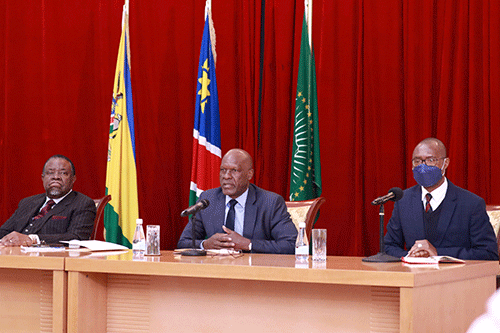Providing an update on the mission to the World Economic Forum’s annual meeting in Davos, Switzerland, in May, President Hage Geingob said it is now time for Namibia to act and deliver.
Namibia made its debut at the forum to showcase its innovative approach to kick-start economic recovery by using its renewable energy potential to contribute to a global just energy transition.
“While there, the delegation made the most of the global platform to showcase our country’s attractive investment destination and its peaceful and orderly environment,” he noted yesterday at the media briefing.
Geingob said Namibia is faced with an enemy, poverty and hunger: “Let us unite against this enemy and attack it with all of our might and resources at our disposal”.
He said government will execute with urgency, work closely with the private sector and mobilise as one people and one nation. At the same occasion, energy minister Tom Alweendo said in absence of investments, the country cannot talk of development, job creation and the fight against inequality.
Alweendo noted marketing the country in Davos on the green hydrogen aspect was very important to make sure it becomes a green hydrogen hub.
According to him, last year was the year of planning this new industry – but now, it is time to implement, and government is ready. “For the past months, we have built sufficient skills to make sure implementation takes place with speed.
One of the areas that attracted attention in Davos was also the discovery of oil offshore,” pointed out the energy minister.
He added it takes about eight years between discovery and production.
Meanwhile, TotalEnergies and Shell, he noted, are committed to accelerating the process to have oil flowing in four years: “Namibia will enjoy economic benefits now from discovery to production phase due to the fact that there have to be many economic activities to take place between now and to production”.
National Planning Commission director general Obeth Kandjoze said the Namibian house was a hive of activity that attracted many investors.
He said, over 140 people walked into the Namibian house to ask questions about the legalities of the new industry of green hydrogen.
Joint venture
Minister in the presidency Christine
//Hoebes yesterday read out letters as immediate responses and reactions from industry players, who wrote to the president as they committed themselves to work together and partner with the Namibian government. Fortescue Future Industries (FFI) wrote regarding discussions held in Davos to form an equal joint venture (JV) to create huge industrial and employment opportunities for Namibians. FFI is a green energy and product company that produces zero-emission green hydrogen from renewable sources.
It invests in zero-emission resources to produce renewable energy.
“Together, we can realise Namibia’s ambition to become Africa’s centre for green industry and green energy. Most importantly, the green energy that I proposed to you is capable of employing tens of thousands of Namibians,” reads the letter that was signed by FFI chairman Andrew Forrest.
Forrest, in the letter, further stated it was in that context that they discussed a multi-generational equal partnership between government and FFI in developing large-scale multibillion-dollar industrial investments spanning the entire green energy industry and green hydrogen value chain. This includes the downstream industry processing of industry products, such as freshwater, aluminium, green iron, green steel, ammonia and green fertilisers, among others. He confirmed FFI’s willingness to enter into a 50/50 JV with the Namibian government to develop a major industrial zone and associated green energy projects that will drive economic growth.
The JV would have the following features and interests: to maximise Namibia’s solar and wind resource potential, the JV and its associated green energy products would be established in a large area, controlled or able to be acquired by the State and would be granted preferred development status for all relevant purposes under Namibian laws.
The JV, with its associate green energy projects, would also include the downstream processing of all commodities that can be derived from electricity as well as the downstream processing of other Namibian or imported commodities that would benefit from using wind or solar power.
He added the JV would further have access to advance technology.


